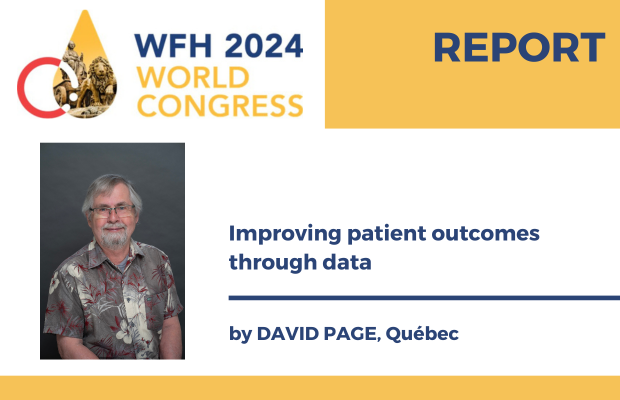The proven importance of data

In the context of the WFH 2024 World Congress, I was invited to present at the Data and Research Workshop on April 21 about how the Canadian Hemophilia Society (CHS) uses data to support its advocacy efforts.
I cited seven sources of data used by the CHS:
- The Canadian Bleeding Disorders Registry (CBDR), a medical registry of clinical information with input by treatment centre staff and owned by the centre directors group, the Association of Hemophilia Clinic Directors of Canada (AHCDC), and managed by the Department of Health Research Methods, Evidence and Impact at McMaster University.
- MyCBDR, the patient portal of CBDR, where each patients report home treatment information, including infusions and injections, and bleeding events.
- The Canadian Hemophilia Registry, now part of CBDR, a medical registry with demographic information including types of bleeding disorders, inhibitors, disease severity, and age.
- PROBE (Patient Reported Outcomes, Burdens and Experiences), managed by the International PROBE Study Group, where patients report on activities of daily living, pain, education, employment, etc.
- Surveys of community members conducted periodically by the CHS on lived experience, satisfaction with current treatments and hopes for future treatments.
- Reports from Canadian Blood Services and Héma-Québec with annual data on utilization and overall cost of treatment products.
- Published research.
The data has proven critical in five advocacy efforts over the last five years:
- access to emicizumab for those with inhibitors to factor VIII in 2018-19;
- access to emicizumab for those without inhibitors to factor VIII in 2020-21;
- access to emicizumab for those with moderate hemophilia A and a severe bleeding phenotype in 2023-24;
- patient submissions to health technology assessment agencies (Canada’s Drug Agency and Quebec’s INESSS) in their evaluations of innovative coagulation products including factor concentrates, non-factor therapies and gene therapies;
- the assessment of the Canadian Integrated and Comprehensive Care Standards for Inherited Bleeding Disorders.
The key messages to the audience present from national member organizations (NMOs) representing people with bleeding disorders were to:
- support medical registries;
- encourage patients to participate in and provide personal data to …
- national and international registries
- PROBE
- encourage NMOs to collect their own patient-reported data to support their advocacy issues;
- follow and use published research data;
- have real-life stories to back up the data;
- combine data with advocacy.
My message to Canadian patients and caregivers is that it is extremely important for those on home treatment to use MyCBDR and, in British Columbia, iCHIP, and for all to participate in CHS surveys when invited. By so doing, you improve your own care and the care of everybody in the community.





